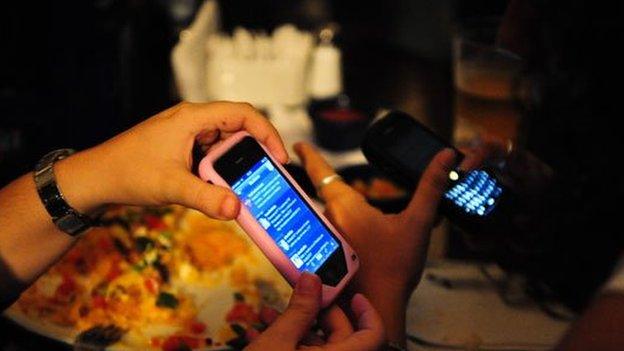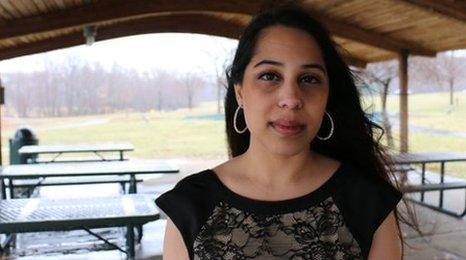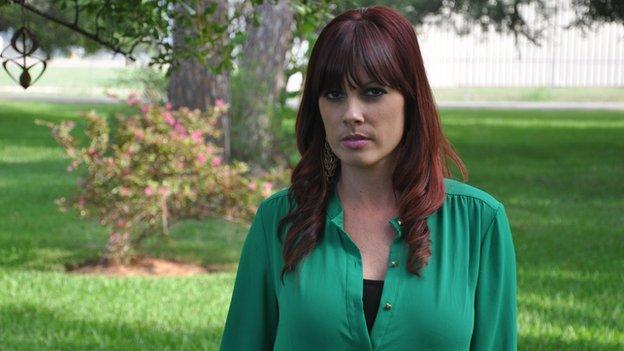'Revenge porn' laws: Ministers urged to go further
- Published

Ministers must outlaw all forms of psychological abuse if attempts to tackle so-called "revenge porn" are to be meaningful, campaigners say.
Justice Secretary Chris Grayling has said the government is "very open" to the idea of changing the law to tackle what he said was a "growing problem".
But charity Women's Aid urged the government to go further and support victims through the justice system.
Lib Dem peers are attempting to make the practice a criminal offence.
Ministers may take "appropriate action" in the autumn, the justice secretary has said.
'Serious discussion'
The term "revenge porn" is used to describe the phenomenon of people posting explicit images of former partners online - either obtained consensually or stolen - to humiliate them following a break up.
Mr Grayling told MPs the practice was becoming a more significant problem in the UK.
He was responding to a question from fellow Conservative Maria Miller.
The former culture secretary has called for a change in the law to tackle the "appalling" practice, saying the Criminal Justice and Courts Bill could be used to toughen up the necessary legislation.
Mr Grayling said Mrs Miller had "done a very important job in raising this issue".
"It's clearly becoming a bigger problem in our society," he told her.
"What I'd say to you today is the government is very open to having a serious discussion about this with a view to taking appropriate action in the autumn if we can identify the best way of doing so."
'Criminalise abuse'
But Polly Neate, chief executive of the Women's Aid charity said: "To be meaningful, any attempt to tackle revenge porn must also take account of all other kinds of psychological abuse and controlling behaviour, and revenge porn is just another form of coercive control.
"That control is central to domestic violence, which is why we're campaigning for all psychological abuse and coercive control to be criminalised. We urge Mr Grayling and the Home Office to go further, and ensure victims can get the support of the criminal justice system for all the abuse they experience."
She said it was "hard to know how many people are affected" but that anecdotally it was thought those "experiencing domestic violence will face the threat or reality of revenge porn".

Hannah felt "lost and alone" after explicit photos of her were posted online.
Laura Higgins, of the UK Safer Internet Centre, said she supported the suggestion of criminalising "revenge porn" and that the organisation was frustrated with the current lack of cohesion surrounding the issue.
But she pointed out that there were already laws in place that had failed to prevent abuse because of how they are applied.
Sarah Green, of the End Violence Against Women Coalition, said: "The impacts of revenge porn can be devastating, from the impact on your everyday life of work and relationships, to the feeling of violation and abuse.
She said it was critical that victims were able to "access support services whether or not they report to the police".
The issue demonstrated how schoolchildren should be educated in issues such as respect, equality and consent in relationships, through compulsory sex and relationships education - she added.
Lawyer Rupinder Bains told BBC Radio 5 live there are provisions within existing legislation to tackle images posted online.
"If the police are onside - and this is where a big issue currently lies, the education for the police in recognising this is a real issue - they can proceed under harassment legislation.
"We have things in place that control electronic images being used for a purpose to cause alarm and distress.

Julian Huppert has previously raised the issue of "revenge porn" with MPs
She said it was possible to take out injunctions to get images removed from the web but that this was costly and time consuming.
Hannah, 21, told BBC's Newsbeat how her ex-boyfriend posted explicit photographs of her on Tumblr.
She said that when she went to the police about it she was told "the most they could do was file a domestic incident report in case his behaviour escalated".
'Failed relationships'
Two peers, Lord Marks and Baroness Grender, have put forward an amendment to the Criminal Justice and Courts Bill which would allow for a one-year jail term for publishing these kinds of images.
The proposal follows a campaign by Lib Dem MP Julian Huppert who has highlighted the issue in the Commons.
He said: "We need to make a criminal sanction available when people share indecent images in the knowledge that consent would not have been given."
Lord Marks said he and Baroness Grender hoped to work closely with the Ministry of Justice "to ensure that this offence reaches the statute book".
But Gabrielle Guillemin, legal officer of international free speech campaign Article 19, has cautioned against "revenge porn" legislation.
She told the Lords Communications Committee: "We have seen a lot of legislation, for example in the United States, to address this particular issue, but you would question whether it is for the criminal law to get involved in what is very often, ultimately, the fallout of failed relationships.
She questioned whether "civil remedies" were not "more appropriate to deal with these kinds of issues".
Legislation criminalising the practice has been introduced in the US states of Texas, Utah, Wisconsin, New York, Maryland, California and New Jersey.
However, the laws in California do not cover self-taken shots, which some campaigners claim may represent up to 80% of all revenge porn.
- Published2 July 2014

- Published2 July 2014

- Published10 April 2014

- Published3 April 2014

- Published11 December 2013
